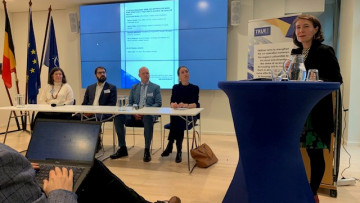European Partnership event highlighted the role of higher education institutions in EU collaborations
On 9 December 2024, the four universities and universities of applied sciences in Turku hosted an inspiring event that explored the ways in which higher education institutions contribute to the European partnerships and how they can work more effectively with companies to achieve the goals of the European Union.
The event, “The Role of European Partnerships in Facilitating a Sustainable and Competitive Europe,” brought together representatives from academia, industry, EU member states and the European Commission to explore how European Partnerships contribute to addressing global challenges through research and innovation. With approximately 80 participants in attendance, the venue at the Permanent Representation of Finland to the EU was filled to capacity, reflecting the strong interest in the topic.
European Partnerships, a key element of the Horizon Europe programme, unite the European Commission with private and public partners to find innovative solutions to European and global challenges. The partnerships are viewed as instrumental in achieving the EU’s sustainability and competitiveness goals. The lessons learned from current initiatives will feed into the next Framework Programme which serves as the main instrument for implementing the EU’s scientific, research and innovation policy.
“Fostering collaboration is essential for building a better future and the long-term, strategic needs of industry and EU competitiveness cannot happen without fundamental and applied research. We need platforms that engage the entire value chain. We hope the event highlighted universities as key partners in the partnerships, from shaping thematic priorities to driving the successful implementation of projects,” says Anniina Jaako, Head of EU Affairs for the higher education institutions in Turku.
Driving solutions through research collaboration
The event centred around two case partnerships: Zero Emission Waterborne Transport and Circular Bio-based Europe, showcasing the critical role of higher education institutions in advancing these initiatives and fostering collaboration with industry to drive meaningful impact.
The event began with an informal coffee session, offering participants the opportunity to network before diving into the programme. Jukka Kola, Director of EU & RDI Affairs at the University of Turku, and Niina Nurkkala, Senior Specialist at the Permanent Representation of Finland to the EU, delivered the opening remarks and welcomed the participants to the event.
The invited speakers of the event highlighted how research organisations are contributing to European Partnerships while also addressing bottlenecks and future challenges. Yagut Allahverdiyeva-Rinne, Professor of Molecular Plant Biology at the University of Turku, presented the work on advancing solar fuels and chemicals through circular approaches. Jarkko Paavola, Research Group Leader at Turku University of Applied Sciences, discussed the digital transformation of the waterborne sector. Inka Orko, Head of Business Development at VTT Technical Research Centre of Finland, provided insights into succeeding in the Circular Bio-based Europe Joint Undertaking.
The panel discussion, moderated by Emmanuelle Gardan, Office Director at the Coimbra Group, focused on how universities can work more effectively together to achieve the goals of the EU. The panellists included Policy Officer Marion Jamard at the European Commission’s DG RTD, General Manager Anders Öster, General Manager at Wärtsilä, Innovation and Programming Manager Samuele Ambrosetti at Bio-based Industries Consortium and Research Manager Mirva Salokorpi of Novia University of Applied Sciences.
In his closing remarks, Reko Leino, Vice-Rector of Åbo Akademi University, emphasised the crucial role of European partnerships and higher education institutions in driving innovation for a sustainable, competitive Europe.
“This really is a question about our own future and the future of our children, and the generations to come. We need to educate and encourage our students and the next generations to believe that with human intelligence everything is possible, solutions to the wicked problems can be found,” Vice-Rector Leino said.
“In this process, the universities and the universities of applied sciences serve in a key role for the entire ecosystem, how fundamental research also can develop into social and scientific innovations and scale-up of ideas,” he continued.
Vice-Rector Leino also raised concerns about the complexity of EU funding instruments, calling for more focus on fundamental research. He also emphasised the importance of expanding collaborations beyond the European Union, highlighting partnerships with science-driven countries like Canada, South Korea, Australia, Japan, and the United States.
The European Partnership event was organised by TRUEnet, Turku Region Universities EU Network. TRUEnet aims to strengthen the co-operation between the region's universities to increase and diversify the share of received EU funding and to support them in developing larger, more effective projects, and to increase their visibility. TRUEnet partners are University of Turku, Åbo Akademi University, Turku University of Applied Sciences and Novia University of Applied Sciences
Photo: Soile Haverinen / Turun yliopisto.
